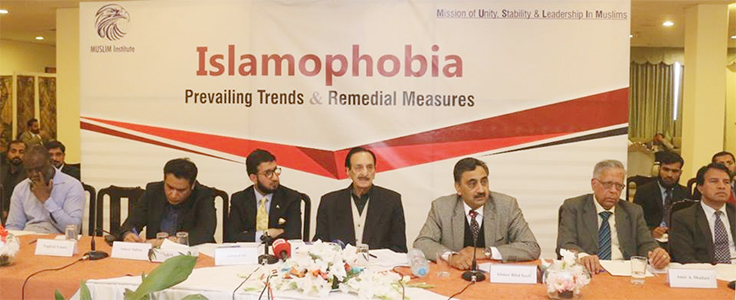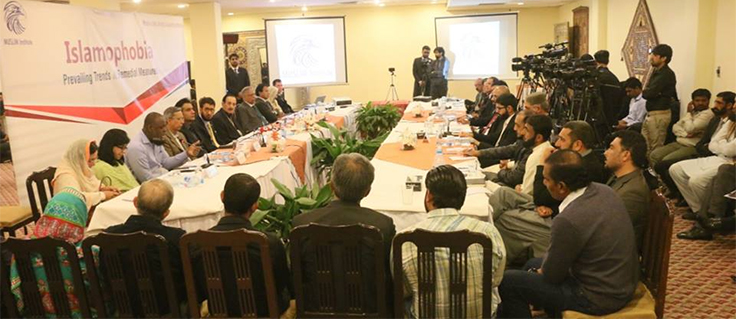Report of Round Table Discussion on Islamophobia: Prevailing Trends and Remedial Measures
|
Senator Raja Zafar ul Haq (Secretary General, Motamar Al-Alam Al-Islami) chaired the RTD. Sahibzada Sultan Ahmad Ali (Chairman, MUSLIM Institute) delivered the opening remarks. Mr. Usman Hasan (Member Editorial Board, MUSLIM PERSPECTIVES Journal) moderated the proceedings of the RTD. Diplomats, Scholars, Academics and Policy Makers participated in the discussion.
|
Expert Panellists
| » |
Advocate Ahmer Bilal Soofi
Former Minister of Law & Justice |
| |
| » |
Sahibzada Ameer Sultan Advocate
Member Standing Committee on Foreign Affairs, National Assembly of Pakistan |
| |
| » |
Dr Maria Sultan
Director General, South Asian Strategic Stability Institute |
| |
| » |
Prof. Dr Tughral Yamin
Associate Dean, Centre for International Peace & Stability, National University of Science & Technology |
| |
| » |
Amb. (R) Amir A. Shadani
Former Ambassador of Pakistan |
| |
| » |
Prof. Dr Muhammad Khan
Department of Politics & International Relations, International Islamic University |
| |
| » |
Dr Bakare Najimdeen
Peace and Conflict Studies, National University of Science & Technology |
| |
| » |
Dr Sarwat Rauf
Department of International Relations, National University of Modern Language |
| |
| » |
Mr. M. Hamza Iftikhar
Research Associate, MUSLIM Institute |
| |

Stage view during the RTD.
|
|
|
|
Brief summary of remarks shared by panellists is observed as following:
Islamophobia has emerged as one of the most unfortunate realities of the 21st Century. The menace of Islamophobia is widening the gap between the Muslim communities and the West. Although Islamophobia has existed since centuries, however its exacerbation has occurred after 9/11 as a result of misinformation campaigns via websites, activists, media, publishing industry and politicians began to cast Islam as a diabolical threat.
“A greater receptivity towards anti-Muslim and other xenophobic ideas and sentiments has, and may well continue, to become more tolerated” – Dr Chris Allen & Dr Jorgen Nielsen in “Summary Report on Islamophobia in the EU after 11 September 2001”
“Since 2001, Muslims in Britain have been constructed as the nation’s significant ‘other’ – an internal and external enemy that threatened both social cohesion and national security” – Dr Leonie Jackson, University of Huddersfield UK in “Islamophobia in Britain: The Making of a Muslim Enemy (2017)"
Islamophobic content being disseminated by Media and Publishing Industry results in constant exposure of non-Muslims to years of news coverage, television shows, movies as well as books and journal articles filled with political rhetoric and misrepresentation of Muslims and Islam as ‘bad’ and ‘evil’. Statements by some political leaders are also adding fuel to this menace by the use of political language such as Donald Trump saying “radical Islam is coming to our shores,” Mike Pence echoing “prevent the evil of radical Islamic terrorism from ever reaching our shores again,” and Australian Senator Fraser Anning rhetorically asking, “Does anyone still dispute the link between Muslim immigration and violence?”
|
|
|

From left: Senator Raja Zafar ul Haq, Sahibzada Sultan Ahmad Ali, Mr. Ahmer Bilal Soofi, Sahibzada Ameer Sultan, Dr. Maria Sultan
|

From left: Dr. Tughral Yamin, Prof. Dr. Muhammad Khan, Dr. Bakare Najimdeen, Amb (R) Amir A. Shadani, Dr. Sarwat Rauf
|
|
In the wake of the terrorist attack in Christchurch, several Islamophobic attacks have followed across the world – especially in Australia and the UK. Islamophobia is appearing in different forms whether it be cultural, ideological, or structural. The growing trend of Islamophobia is very dangerous and hampering the promotion of peace in the world. It is giving birth to confusion and state of fear in Muslim world. Muslims need to respond to Islamophobia in an effective manner and need a strategy – for which it is pertinent to consider its main causes. Firstly, Islamophobia is a response to the emerging distinct Muslim identity throughout the globe. Secondly, poor knowledge about nations and cultures is causing grave misunderstandings, considering the world population is almost 7.53 billion among which there are 1.8 billion Muslims, constituting 24% of total world population. Such a big part of the population needs to adopt the strategy to convey its message of peace effectively. Third, the horrifying incidents of 9/11 and 7/7 London bombings have helped extremists to strengthen their viewpoint of hate against Muslims throughout the West. Fourth, the reactionary statements in past few years from the political leaders are also causing the demise of multi-culturalism. Fifth, Islam is a matter of heart and soul for the 1.8 billion Muslims across the globe, thus passing laws and hindering freedom of religion would further exacerbate the problem.
|
|
|
It is pertinent to discuss legitimacy of Islamophobia. Religious legitimacy of Islamophobia is not a contemporary phenomenon but it is present since ages. Europe is moving from political incorrectness to ‘political correctness’. In past it was difficult to discuss Islam or insult Muslims publically. In the wake of this ‘political correctness’, today insulting Muslims to show anger towards Islam is politically correct thus politically legitimate. Another aspect is the public sphere legitimacy which has connection with religious and political legitimacy. Waving a flag or banner against Islam is common now as it is legitimate because it draws its acceptance from the public sphere, political and religious institutions. The above mentioned reality is heart wrenching which is further widening the gap between distinct civilizations across the globe.
Islam is not only a religion; it is complete code of life. Islam provides guidance in economic, individual and political aspects. It promotes peace and brotherhood while providing guidance on international system of justice. It is proven in history that destiny of the world changed with the advent of Islam, for example, early periods of Ottoman Caliphate, people stood-up against oppression and formatted the society and system based on justice. Islamic society has such traditions in which injustice and oppression in all its forms had never been tolerated. Despite the presence of United Nations, Muslims are being oppressed in Afghanistan, Palestine, Kashmir, Yemen, Libya, Syria, Myanmar and other parts of world. Incident of Christchurch indicates that Islamophobia is becoming more organised and increasing number of people will continue to commit heinous acts of terrorism against Muslims unless the international community acts in a timely as well as befitting manner.
|
|
|

Hall view during the round table discussion.
|
|
Following are the recommendations extracted from the discussion:
|
| » |
Muslim leadership, nations, civil society groups and organisations should play an active role in spreading the true image of Islam and condemn Islamophobia. |
| |
| » |
International Community and UN in particular should take notice of the rise of Islamophobic incidents and unequivocally condemn such incidents. |
| |
| » |
Muslim leadership needs to be galvanised in countering Islamophobia via both political and diplomatic channels. |
| |
| » |
Muslim countries’ consulates in non-Muslim countries should also play an active role in organizing events and interacting with the local community to ensure that the true image of Islam is being represented. |
| |
| » |
OIC should persuade other nations and organisations to take action against Islamophobia. |
| |
| » |
International Legal Framework or Convention should be introduced that addresses not just Islamophobia but discrimination against all religions. |
| |
| » |
Pakistani consulates and missions abroad should play an active role in organizing events and interaction with local community to ensure that the true image of Islam is being represented. |
| |
| » |
Pakistani leadership should reach out to the leadership of Western governments and work with them to curb Islamophobia in their respective societies, and enhance the image of Muslim nations. |
| |
| » |
Scholars and academia should make a conscious effort to tackle and counter the right-wing ideologies such as “clash of civilisations” which exacerbate Islamophobia. |
| |
| » |
Intellectual and research studies should be presented to international organizations such as the OIC and UN for further consideration and action on Islamophobia. |
| |
| » |
Universities should actively organize conferences to gather academic research on the subject matter of Islamophobia and lay out remedial measures as well as policy guidelines. |
| |
| » |
Media and Publishing Industry should become more responsible and aware of the long-term consequences of its content. |
|
| |
Download pdf
Newsletter
Share




